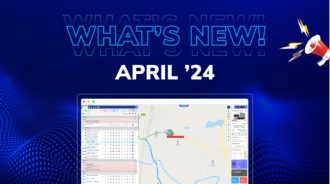In today’s fast-paced logistics industry, efficient route planning is not just a convenience; it’s a necessity. That’s where truck route optimization software comes into play, revolutionizing the way fleets operate. Let’s explore what truck route optimization software is, why it’s essential, and what features users should look for to reap its benefits.
What is Truck Route Optimization Software?
Truck route optimization software is a game-changing technology designed to streamline the planning and execution of delivery routes. It uses advanced algorithms and real-time data to determine the most efficient routes for trucks. This software considers various factors, including traffic conditions, delivery windows, vehicle capacity, and driver availability, to optimize routes for speed, fuel efficiency, and overall effectiveness.
Why is Truck Route Optimization Software Needed?
Streamlining Operations for Efficiency
Maximizing Route Efficiency: The primary advantage of route optimization lies in its ability to calculate the most efficient routes. This isn’t just about finding the shortest distance; it takes into account multiple factors such as traffic patterns, road conditions, and delivery time windows. By optimizing routes, companies can ensure timely deliveries, which is crucial for customer satisfaction.
Reducing Fuel Costs: With optimized routes, trucks drive fewer miles. This directly translates to lower fuel consumption, which is one of the major expenses in trucking operations. Fuel cost savings not only benefit the company’s bottom line but also contribute to environmental sustainability by reducing the carbon footprint.
Enhancing Driver and Vehicle Management
Improved Driver Management: The software provides real-time updates and tracking, allowing managers to monitor driver performance and adherence to schedules. This leads to more accountable and efficient operations, as drivers are aware that their performance is being monitored.
Vehicle Maintenance Scheduling: By tracking the distance and routes traveled, the software can also assist in scheduling regular vehicle maintenance. This proactive approach prevents breakdowns and prolongs the vehicle’s lifespan, ensuring that the fleet remains in optimal condition.
Increasing Customer Satisfaction
Accurate Delivery Predictions: Customers today expect precise information about their delivery timings. Truck route optimization software enhances the accuracy of delivery time forecasts, leading to improved customer satisfaction and trust.
Real-time Updates: The ability to provide real-time updates to customers about the location and estimated arrival time of their deliveries adds a layer of transparency and improves customer experience.
Reducing Operational Costs
Minimizing Idle Time: By optimizing routes, the software significantly reduces idle time and unnecessary detours, leading to a more productive use of resources.
Decreasing Overheads: The cumulative effect of fuel savings, efficient driver management, and reduced vehicle maintenance costs substantially lowers the overall operational costs.
Improving Safety Standards
Enhanced Safety: Optimized routes also mean safer routes. The software can avoid routes with known safety issues, reducing the risk of accidents and ensuring the safety of drivers and cargo.
Key Features:
When choosing truck route optimization software, consider these essential features:
- Real-Time Tracking: Software should provide real-time updates and adjustments to routes.
- User-Friendly Interface: Ease of use ensures that staff can effectively utilize the software.
- Customization Options: The software should cater to specific business needs and constraints.
- Analytics and Reporting: Insightful data helps in making informed decisions and improvements.
Advantages of Truck Route Optimization Software
Adopting truck route optimization software offers numerous advantages:
- Maximized Productivity: By optimizing routes, trucks can complete more deliveries in less time.
- Fuel Savings: Shorter and more efficient routes lead to significant fuel savings.
- Reduced Wear and Tear: Efficient routing decreases the overall mileage, prolonging vehicle life.
- Improved Compliance: Software can ensure compliance with regulations such as driver working hours.
In conclusion, truck route optimization software is a vital tool in the logistics and transportation sector. Its ability to streamline operations, reduce costs, and enhance customer satisfaction makes it an invaluable asset for any fleet. As the logistics industry continues to evolve, embracing this technology will be key to staying competitive and efficient.



